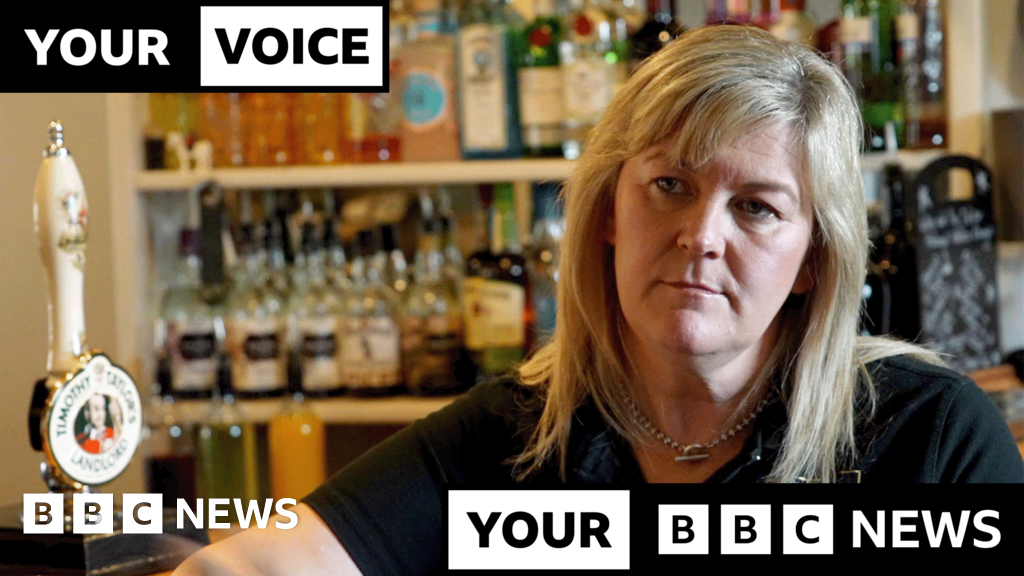All my savings are going: Pub landlords fear closure as costs rise
- BBC News
Behind the bar at The Kings Head in Pollington, east Yorkshire, Emma Baxter has a problem. She runs the pub in her evenings - but it makes no money.
It is the last remaining pub in the village after another shut down, along with a greengrocer and the post office. She says she cant take a salary from the business.
"I run the pub for the love of it and for the fact Im a village girl," she says.
"Im a strong believer in the fact that its the centre of the community and I said when I bought it I would keep it going.
"But my electricity bill has doubled in the last six months – where is that money going to come from?"
Emma felt so strongly about the tough financial situation facing many pubs that she contacted Your Voice, Your BBC News - an initiative to share the stories that matter to you.
According to the British Beer and Pub Association, the number of pubs in the UK has steadily decreased every year since 2000. Some 15,000 pubs have closed in that time, including 289 last year - the equivalent of six a week.
The average price of a pint is set to increase from £4.80 to £5.01. Budget measures mean that pubs face a loss of 9p on each pint if they continue to charge the same pre-budget prices. This means the price of a pint will need to rise by 21p to £5.01 for pubs to maintain current 12p profit.
The industry faced particular struggles during the Covid pandemic, but Emma believes things have deteriorated in the last two years - and its left some pubs struggling to stay afloat.
"We saw maybe one price increase a year if we were lucky [during Covid] - sometimes we didnt even see that," she says.
"Now were seeing three for a year and weve got another one coming. That will be the second one in the last two months. So how much more is this going to happen?"
At the same time as battling rising costs, she is attempting to entice customers in.
"I think everybodys trying their best - but you cant compromise the service and the quality that you give and the environment that you give.
"So you cant turn around at 9pm, turn all the lights off and make people sit around one bulb, you know. Thats not what people come out for."
Pubs operate under various business models. There are free houses, which are not owned by a brewery or landlord stipulating where landlords buy their beer from. These are often run by owner-occupiers.
Then there are brewery-owned pubs, which generally only sell beers from that brewery.
And there are firms that own thousands of pubs and are occupied by tenants - often referred to as a "pub co".
Some tenants are also obliged to buy the drinks they sell from the same company. In some cases they are responsible for the upkeep of the building too.
Maurice, a tenant for one such company in Sheffield, tells the BBC he is trying to renegotiate his deal to run the pub. He says he will have to close the establishment if he cant get better terms.
"The prices that we are charged for spirits, beer, is ridiculous. I could actually go to a supermarket and buy about two bottles for what theyre charging me for one. But Im not allowed to because Im tied," he says.
He also wants to see "pub co" breweries offered more help with the maintenance of their pubs, rather than leaving tenants to chase money for repairs.
Having been in the trade all his working life, he says he got involved with running a pub because of his love for community, but hes struggling to see a bright future.
"At the end of the day, youve got to make money. Financially, were losing about £1,000 a week at a minimum here. And thats been for about the last couple of months.
"I cant afford to carry that anymore. All my savings are going."
For its part, the UK government says the pub is a central part of Britains national identity and it is working hard to support the industry.
"We are a pro-business government and we know the vital importance of pubs to local communities and the economy, which is why we are supporting them with business rates relief and a 1p cut to alcohol duty on draught pints."
However, campaigners say thats not enough.
"Bringing down the VAT rate for hospitality would be a massive win," says Paul Crossman, landlord of The Swan, in York.
Paul, who is also chair of the pressure group the Campaign for Pubs, says: "I know the Chancellor of the Exchequer wont like that because there will be a cost attached to it, but surely getting 10% VAT from businesses that are still open is better than asking 20% from businesses that cant sustain that and will close."
There are some positive stories, too. Meg and Patrick have recently taken over the oldest pub in Chesterfield, Derbyshire, and say their re-opening "couldnt have gone better".
Both former teachers, the couple had a shared dream of running their own pub, eventually saving enough to buy the Ye Royal Oak in the town centre.
They say being a free house pub has been helpful, as they are in control of what they do.
Patrick that the support hes witnessed in the community has given him hope.
"Beer and pubs are such a massive part of the fabric of British life that we think that thats not something thats ever going to go away," he says.